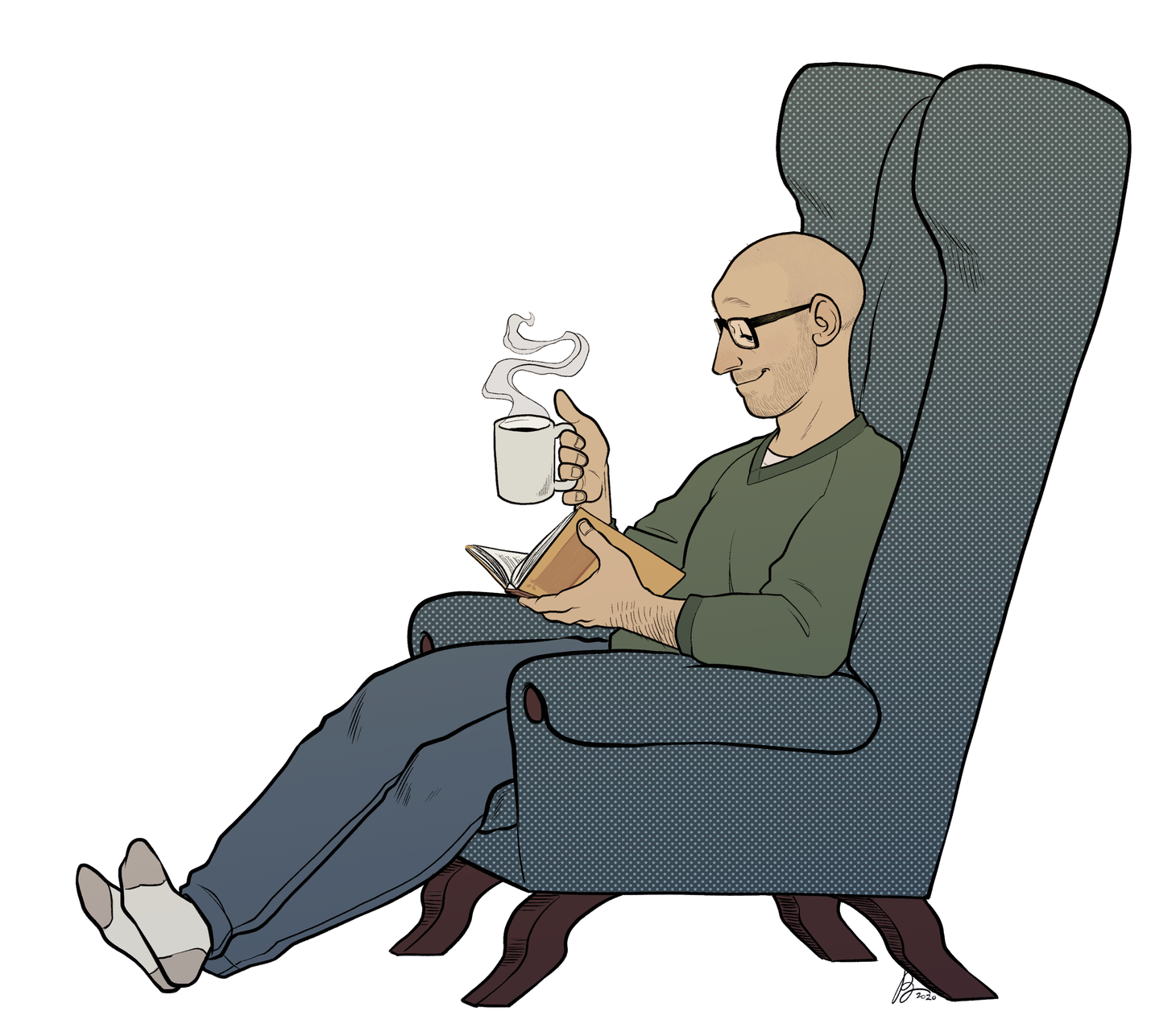The Best Books I Read in 2024

I realized last year that my job has become to read as much as possible and filter that reading for useful ideas. Whether I'm trying to improve client outcomes at my agency, write something useful for this blog, or teach a practical process for changing your life for the better in DSS, the process is the same: read, connect, distill.
As such, I will share the most interesting and useful books I read last year. If you're curious, you can also see my best books of 2021 and 2022 (I skipped 2023).
Below I've included the books, a link to purchase them (no affiliate stuff), an official description, and then some of my thoughts. These are in no particular order.
Let's jump in.
Inadequate Equilibria - Eliezer Yudkowsky
Eliezer Yudkowsky’s Inadequate Equilibria is a sharp and lively guidebook for anyone questioning when and how they can know better, and do better, than the status quo. Freely mixing debates on the foundations of rational decision-making with tips for everyday life, Yudkowsky explores the central question of when we can (and can’t) expect to spot systemic inefficiencies, and exploit them.
This is an interesting and challenging book centered around a single question: when you should think you're unusually good at something?
Yudkowsky argues against what he sees as a tendency among rationalists to be too humble when assessing their own skill levels in relation to the world around them. Our society is broken (or what Yudkowsky would call "inadequate") in many ways - simply because something's never been done doesn't mean it can't work.
Does that mean you can out-think the stock market? Not likely. There are situations, particularly those in which incentives are aligned with competence, where finding hidden and profitable loopholes in everyone else's thinking is extremely unlikely. But Yudkowsky still wants you to look - or, at the very least, not to dismiss your own thinking outright.
Certain to Win - Chet Richards
Certain to Win by Chet Richards applies military strategies, particularly those developed by John Boyd, to the realm of business. The book emphasizes the importance of agility and adaptability in competitive environments, using the OODA Loop framework (Observe, Orient, Decide, Act) as a central tool for decision-making.
A business book, a military-strategy book, a mix of both.
Three things about this book fascinated me:
1.) John Boyd himself was a cantankerous, eccentric, and challenging intellectual figure; I found him interesting.
2.) The "bottom-up" approach Boyd taught - an approach to strategy that prized autonomy, flexibility, and creativity, appealed to my less-than-hierarchical tendencies.
3.) There's significant overlap in some of the "structure" of what Boyd taught and what W. Edwards Deming taught regarding Statistical Process Control. Deming's vision of a company in which every single employee is involved in the process of quality improvement "rhymes" with Boyd's vision of a military united in purpose and vision but flexible enough to pursue new objectives when faced with an ever-changing and chaotic situation.
As someone who always looks to manage people as little as possible - to give them tools, rather than orders - I found Richards' book a fascinating read.
Dear Fellow Time-Binder - Christopher Mayer and Science and Sanity - Alfred Korzybski
Mayer's book is A series of short summaries and brief overviews of many main ideas within general semantics, all couched in the style of personal letters. It is designed to give people an intimate view into many insights offered with general semantics, and just as equally, it represents how principles of general semantics can be applied to everyday life. Meanwhile, Science and Sanity is a foundational text that examines the relationship between language, thought, and human behavior. First published in 1933, the book introduces the concept of general semantics, which seeks to understand how linguistic structures influence our perceptions and interactions with reality.
2024 was the year I discovered General Semantics, and what a discovery that was.
Alfred Korzybski's Science and Sanity is the magnum opus of General Semantics. It lays out the intellectual work in painstaking detail, attacking "Aristotelianism" from every angle imaginable. It's challenging, frustrating, strange - and ultimately wonderful.
But it remains true that I didn't feel I got GS until I read Dear Fellow Time-Binder - mostly because Mayer makes a concerted effort to lay out the concepts of GS in approachable language, and to focus on its applications to everyday life. Korzybski, by contrast, only starts getting around to the "extensional devices" (essentially, the everyday "practices" by which one implements GS concepts) towards the very end of his 900-page work.
If I were to do this over, I would read Dear Fellow Time-Binder first, then tackle Science and Sanity. Regardless, both have wormed their way into my brain and changed the way I see the world - which is the highest compliment I can pay.
The Field Guide to Human Error Investigations - Sidney Dekker
The Field Guide to Understanding 'Human Error' by Sidney Dekker is a comprehensive exploration of the concept of human error within organizational contexts. The third edition of this guide emphasizes moving beyond traditional views that attribute safety issues to individual mistakes, often referred to as the "Bad Apple Theory." Instead, Dekker advocates for understanding human error as a systemic issue that arises from the complexities and trade-offs inherent in organizational environments.
Oh my GOD, I love Sidney Dekker.
I read Dekker's Drift Into Failure a few years ago and had my mind completely blown by Dekker's application of systems thinking to what we casually call "accidents" - plane crashes being the primary example. How can such a sophisticated system, with so many checks and balances and serious people paying attention to it, go so terribly wrong?
While Drift was a theoretical tour-de-force, The Field Guide To Human Error Investigations is more about the how - given a problem, how do you figure out what caused it and how to stop it from happening again?
Dekker's approach is to treat the people involved in such accidents as essentially "good" - almost all the time, they are hard-working, well-meaning people just trying to do the best they can. Rather than blame the accident on "human error," Dekker tries to figure out what, within the problem environment, may have encouraged such errors - or, indeed, made them inevitable.
There is direct application here to any number of other contexts. It made me think about problems in my business (or even my personal life) in a very different way.
Moneyball is a quest for the secret of success in baseball. In a narrative full of fabulous characters and brilliant excursions into the unexpected, Michael Lewis follows the low-budget Oakland A's, visionary general manager Billy Beane, and the strange brotherhood of amateur baseball theorists. They are all in search of new baseball knowledge―insights that will give the little guy who is willing to discard old wisdom the edge over big money.
I know I'm very late to this party. I know there's a movie (I haven't seen it). But.
This book is SO GOOD. I tore through it, despite knowing almost nothing about baseball. Lewis' ability to take statistics - of all things - and somehow turn its application to baseball into an epic quest brimming over with human interest stories is remarkable.
The cliché of "nonfiction that reads like a novel" applies here. Go read it.
Thought Reform and the Psychology of Totalism - Robert Jay Lifton
Thought Reform and the Psychology of Totalism: A Study of "Brainwashing" in China by Robert Jay Lifton is a seminal work that analyzes the psychological processes behind thought reform, particularly as experienced by individuals subjected to indoctrination by the Communist Chinese government. First published in 1961, the book draws on extensive interviews with both Chinese citizens and Western prisoners of war who underwent these brainwashing techniques.
I spent a good chunk of this year learning about "brainwashing," and if you're going to do that you have to engage with Lifton's book.
Lifton has his theories about what brainwashing is and how it is accomplished - I'm not sure how much holds up in the current scientific paradigm, but it's extremely useful purely from the perspective of understanding how coercive (and non-coercive) influence "works."
At the same time, Lifton's depiction of life inside Communist Chinese prisons is harrowing. Ultimately, the human interest piece makes Lifton's book stand out from most books on this topic, and his detailed breakdown of people's experiences is riveting.
Another excellent book on the topic - more modern, and also including the author's first-hand experiences of being in a cult - was Love, Terror, and Brainwashing by Alexandra Stein, which applies an "attachment model" to the experience Lifton describes (in fact, I found Lifton's book through its multiple citations in Stein's work). If you're looking to wrap your head around brainwashing, those two make very different but complementary entry points.
Teaching Seminar With Milton H. Erickson
This volume presents the complete transcript of a five-day seminar with Milton Erickson. Here the reader will experience Erickson talking about his method of therapy, demonstrating his techniques, telling one fascinating anecdote after another - anecdotes which often produce feelings of cognitive dissonance and surprise, but eventually illuminate new ways of seeing patients and thinking about psychotherapy.
Books on hypnosis are very hit or miss, and there's much more "miss" than "hit" out there. This book was fascinating because it's not a written work per se, but instead a transcript of a multi-day seminar for clinicians led by Milton Erickson in his home.
I've read a bit of Erickson, but everyone who knew him said it was his person that made his techniques "work" - his tone, his strange intonation, his way of layering meaning upon meaning into every sentence. Being in his presence alone had a "hypnotic" effect.
This book, though we can't access the sound of his voice, does an incredible job of getting across a bit of what being around Erickson must have been like. I found myself less reading the book for practical takeaways than imagining what it must have been like to be there - a transportive experience that's VERY rare in a book of this type. If you're interested in Erickson or hypnosis more broadly, this is a very easy recommendation.
The Confident Mind - Dr. Nate Zinsser
The Confident Mind: A Battle-Tested Guide to Unshakable Performance by Dr. Nate Zinsser focuses on the psychology of confidence and its critical role in achieving peak performance across various fields. Drawing from his extensive experience as the director of West Point's Performance Psychology Program, Zinsser provides readers with practical strategies to cultivate and maintain confidence.
A project I had this year was to 1.) Improve my "mindset," and 2.) figure out if "mindset" was even a thing.
I'm not sure where I ended up on that issue - my definition of mindset ended up being quite idiosyncratic - but The Confident Mind was the best work I found on the actual application of "mindset work" to real performance. Zinsser works with both military and sports personnel, and as a result his approaches are practical, pragmatic, and performance-focused.
Zinsser's writing on reframing your failures - specifically, by framing them as temporary, non-representative, and limited-in-scope - is worth the price of admission on its own and has become a regular part of my mental repertoire.
The Secret Mind of Bertha Pappenheim - Gabriel Brownstein
In this unusual work of science, history, and psychology, Brownstein does more than describe the controversies surrounding this extraordinary woman. He brings Pappenheim to life—a brilliant feminist thinker, a crusader against human trafficking, and a pioneer—in the hustling and heady world of nineteenth-century Vienna. At the same time, he tells a parallel story that is playing out in leading medical centers today, about patients who suffer symptoms very much like Pappenheim’s, and about the doctors who are trying to cure them—the story of the neuroscience of a condition now called FND.
How to describe this book? This is both an exploration of FND - functional neurological disorder - and the many people who suffer from it and from mistreatment by doctors who believe they're simply "making it up."
It's also an exploration of all such mystery ailments, including the social, political, and medical history of hysteria as a diagnosis (Brownstein thinks that FND is hysteria for all intents and purposes).
It's also a detailed breakdown of Sigmund Freud and the case study that made his career: that of Anna O., whose real name was Bertha Pappenheim. Anna O. enshrined hysteria as a diagnosis, repressed sexual thoughts or trauma as its cause, and the "talking cure" (psychoanalysis) as its cure - all of which, Brownstein argues, were a result of Freud's misrepresenting the case generally and lying about how the treatment went.
As if all that weren't enough, Brownstein works to make Pappenheim - the real Pappenheim, rather than the one filtered through Freud's writings - come alive, revealing her character and following her past the point where Freud's case study ends.
All in all, this was a challenging, fun, fascinating, lively book. It reads like a detective story, but it also does the hard work of ensuring you have the intellectual context that has swirled around Freud and Pappenheim for nearly a century. A great read.
Analyzed by Lacan - Betty Milan
Analyzed by Lacan brings together the first English translations of Why Lacan, Betty Milan's memoir of her analysis with Lacan in the 1970s, and her play, Goodbye Doctor, inspired by her experience. Why Lacan provides a unique and valuable perspective on how Lacan worked as psychoanalyst as well as his approach to psychoanalytic theory. Milan's testimony shows that Lacan's method of working was based on the idea that the traditional way of interpreting provoked resistance.
Lacan, Lacan, Lacan. I've enjoyed reading about Lacan over the past few years - not listed here, but also read this year was the wonderful 6 Moments in Lacan, which I enjoyed but was a bit too "in the weeds" for this list (including me - if I'm being honest, I really get maybe 35% of any Lacanian stuff I read. The rest just rattles around in my subconscious somewhere).
But what was Lacan actually like? What was it like to sit in the chair across from him - and, at some mysterious moment in your analysis, to then move to the couch? What was scansion (the sudden and abrupt stopping of the session) like in practice? Was it just annoying? What would Lacan say, if anything?
Analyzed By Lacan tells you just that - it's one woman's story (now a psychoanalyst herself) of what it was like to be in the room with Lacan. While Milan's particular issues (many arising from her experience as a Brazilian expatriate in France) didn't resonate with me personally, the psychoanalytic experience is universal. Milan's willingness to explore the depths of her own psyche - and the ways in which Lacan both challenges and encourages her - are interesting.
I find it refreshing to see more of Lacan actually doing the thing he was supposed to be good at - psychoanalyzing. Lacan was a teacher of analysts, and so much of his work is theoretical or steeped in confusing language that it's easy to forget he actually sat across from patients like any other analyst.
This one's a bit of a weird recommendation - I wouldn't make this your first introduction to Lacan (for that, I'd recommend the Lectures On Lacan series The Subversion of the Subject and The Dialect of Desire, which is lively, fun, well-explained, and absolutely blew my brain open when I heard it the first time. I recommend listening to it while you walk the streets of a city you don't know very well). But if you're already on the Lacan train, this book makes an excellent addition.
The Experience Machine - Andy Clark
The Experience Machine: How Our Minds Predict and Shape Reality by Andy Clark presents a groundbreaking exploration of cognitive science, focusing on the brain's predictive capabilities and how they shape our perception of reality. The book argues that rather than passively receiving sensory information, our minds actively construct experiences based on prior expectations and learned patterns.
This book wins the "single biggest change to my model of the world" award. (Previous winners are The Master and His Emissary by Iain McGilchrist and Sadly, Porn by Edward Teach).
The Experience Machine is the lay-public-facing version of Clark's thesis: that the brain operates as a prediction-machine, simultaneously predicting and verifying past predictions along multiple levels of abstraction (on the sensory level, for example, as well as on the conceptual level).
But that's not all. Clark pulls both from neuroscience and computer science to argue that the most computationally efficient way to both predict and verify predictions is by simulating experience; when simulations are found to differ significantly from the incoming stream of perceptions, our focus is drawn to reality and we are fully "present;" before that point we are, in a very real way, experiencing our predictions of the world as much as we are the world itself.
The Experience Machine is highly readable and is the way to jump into Clark's thinking if you're not a scientist. However, Clark makes the same argument in a much more technically rigorous way in his book Surfing Uncertainty; I read both this year (though I will definitely need to read Surfing again).
I am doing a poor job of expressing Clark's argument here and recommend you pick this book up. It has changed the way I see the world, and what better recommendation is there?
Happy Reading!
-Dan
Something Cool I'm Reading:

From the inimitable Tyler Cowen.
I will admit - I have not really processed this post. It feels like there's something important here, but I haven't quite fit it into my model of the world yet. However, I'd love for you to read it and let me know what you think.
Better Questions Newsletter
Join the newsletter to receive the latest updates in your inbox.

